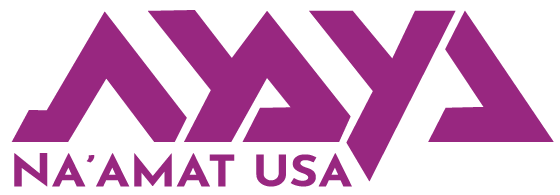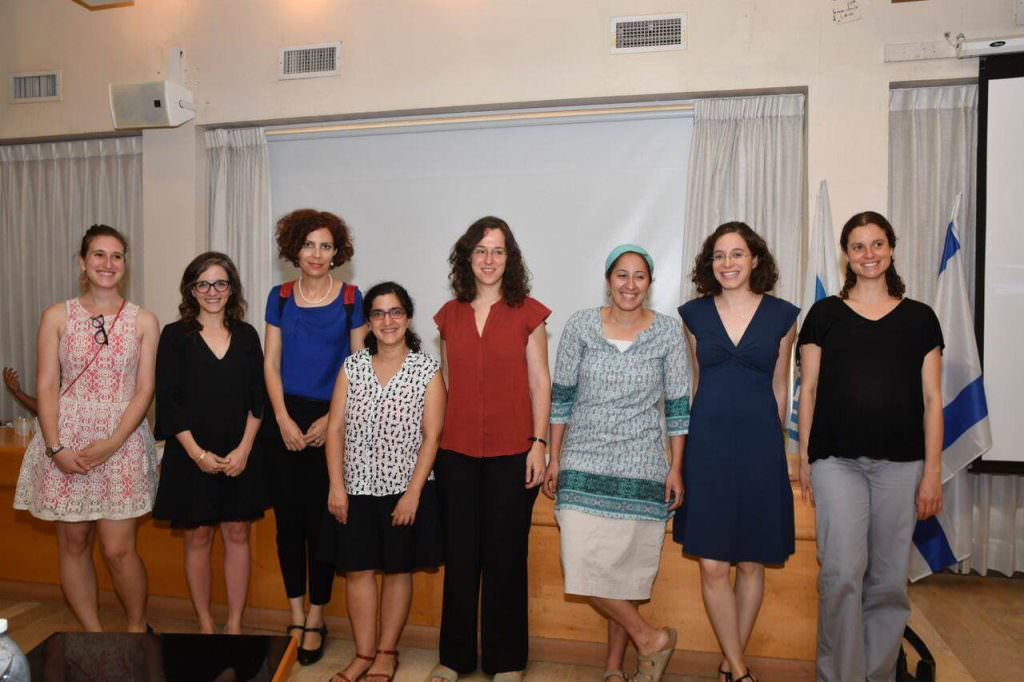Dear Haverot,
The Annual NA’AMAT Scholarship Ceremony took place last Monday with the participation of Galia Wolloch, President NA’AMAT Israel, Masha Lubelsky, President NA’AMAT Scholarship Fund, Prof. Hanna Naveh from Tel Aviv University, Head of the committee for research grants in gender studies, and Prof. Shosh Arad, President Ruppin Academic Center, Head of the committee for research grants in Science.
210 female students studying for their Bachelor and Master degree were granted a scholarship of 2,000 Shekels each. This year there was an increase in the number of female students studying Scientific / Technological professions who received a scholarship. 90% of the recipients are studying engineering, sciences, computers, medicine, veterinary, etc…, and / or for their Master degree.
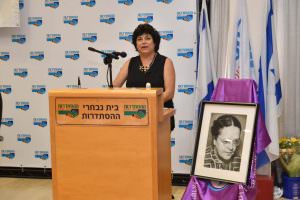 In addition, this was the tenth year that NA’AMAT gave 4 research grants, each of 10,000 Shekels, for Ph.D. students, for research in the field of status of woman and gender studies.
In addition, this was the tenth year that NA’AMAT gave 4 research grants, each of 10,000 Shekels, for Ph.D. students, for research in the field of status of woman and gender studies.
This year, for the third time, we gave 4 additional research grants in sciences, each of 10,000 Shekels, from the Beba Idelson Foundation, for Ph.D. students, for research in the field of Physics and Mathematics.
In my opening words I conveyed, on behalf of NA’AMAT, our utmost appreciation and gratitude for the ongoing efforts of NA’AMAT U.S.A and NA’AMAT Canada in helping us to maintain and increase the Scholarship Fund.
We really do make a difference for our students! We should all be very proud of this unique enterprise for the success of our young generations and the promotion of higher education.
Below are summaries of the research papers of the Ph.D. grant recipients and a translation of the speech by Mirika Brezis, as were presented in the ceremony. Mirika is studying for her degree in Medicine at Tel Aviv University.
Mirika spoke on behalf of all the students who are studying for the Bachelor and Master degree.
I’m enclosing some photos from the event. (For additional photos you can look at the NA’AMAT International Facebook).
Also enclosed is a short video from the ceremony, thanking NA’AMAT USA and NA’AMAT Canada for their utmost efforts in fundraising for the Scholarship Fund.
Best wishes.
Yours sincerely,
Shirli Shavit
Director, International Department
Opening Remarks of Mirika Brezis
A medical student, Mirika spoke on behalf of the B.A. & M.A. students:
Shalom to everyone and good afternoon,
My name is Mirika Brezis. I was chosen to represent the scholarship winners today and honor you with a few words.
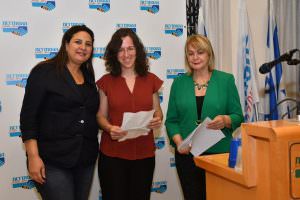 First of all, I’ll begin with some words of thanks to Na’amat Israel, Na’amat USA and Na’amat Canada, which, as every year, implement many projects intended to strengthen and advance women. I thank you for the generous scholarship that you have granted me and the rest of the women here and hope that you will continue your work faithfully. I also wish you many years of fruitful work.
First of all, I’ll begin with some words of thanks to Na’amat Israel, Na’amat USA and Na’amat Canada, which, as every year, implement many projects intended to strengthen and advance women. I thank you for the generous scholarship that you have granted me and the rest of the women here and hope that you will continue your work faithfully. I also wish you many years of fruitful work.
Second, I wanted to wish much success to the rest of the women who received the scholarship. I wish for you to continue leading in the fields that you have chosen and that you serve as a source of inspiration.
I have been asked to tell you a bit about myself today.
My name is Mirika, a student of medicine, currently finishing the first year of the shortened four–year curriculum at Tel Aviv University. Upon conclusion of the academic year, I understand how much the profession that I have chosen means to me. The studies, which focus both on strengthening our academic skills and strengthening interpersonal skills, integrate the essence of the profession – empathy and insight. This combination is what attracted me to switch to medicine after seven years of engaging in biological research. The studies of the last year were challenging and interesting, and I am finishing them full of curiosity for the coming years. I am often asked what I want to do when I finish this long track. I ask myself the same question; there are many fields in medicine that interest me, and I’m still at the beginning of the path, so I am giving myself the possibility of discovering and getting to know the various aspects of the profession. However, my gut instinct tells me that I will apparently be a doctor who emphasizes the interpersonal link – on the patients themselves and their illnesses.
I grew up in Israel, in Jerusalem, in a family that travels very often, so I was also in the USA and France for many years. I studied in all three countries and chose at age 18 to settle here in Israel and serve in the army. My service with the IDF spokesman and international communications was exceptionally significant for me. I have continued to serve actively in the reserves since my discharge 8 years ago.
During the last few years, I have had the privilege of volunteering for the “Amcha” association and becoming familiar with and close to three Holocaust survivors. I want to share with you my bond with Miri, who last week celebrated her 97th birthday. Since I grew up without grandparents and she has no grandchildren, we adopted each other – she as my grandmother and I as her granddaughter. At her advanced age, her body is no longer at its healthiest; however, she continues to view life with such strong optimism and healthy humor. Each visit with her is accompanied with tea and cake, with a heaping teaspoon of hearty laughter, a mantle of meaningful conversations, and above all, with deep closeness.
I am giving you the taste of my bond with Miri because the tremendous feminine test tube that I strive for contains in no small measure that same optimism and zest for life that Miri has. Each time I leave her I feel more erect with more meaning and generosity. I hope that you, the scholarship recipients today, will continue to fulfill yourselves on the path that you have chosen for yourselves, together with the continued feminine significance that is in each and every one of us. I hope that you’ll continue to stand with head held high and with humor and happiness while facing the challenges of life.
Statement of Neta Arad, a Ph.D. student in the field of Physics & Mathematics
Dear Naamat Donors,
I am writing you this letter to thank you for your generous scholarship. I was very excited to hear that I was selected to be one of the recipients of the scholarship.
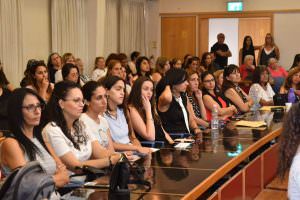 I am a PhD student in the field of physics. My research is focused on optical properties of silicon nanostructures, meaning structures that have typical size of 1/1000000000 meters! When the dimensions are reduced to this level, the laws of physics change, and new phenomena are observed. For instant, if we irradiate bulk silicon with blue laser, we will not be able to see anything but the reflected light. But irradiating nanostructures of silicon with the same laser will lead to the emission of red light (for example) that is even visible to the naked eye. These size dependent phenomena can be the basis to several application such as faster optical network communication, new lasers, more efficient photovoltaic applications, biological and chemical sensors, and more.
I am a PhD student in the field of physics. My research is focused on optical properties of silicon nanostructures, meaning structures that have typical size of 1/1000000000 meters! When the dimensions are reduced to this level, the laws of physics change, and new phenomena are observed. For instant, if we irradiate bulk silicon with blue laser, we will not be able to see anything but the reflected light. But irradiating nanostructures of silicon with the same laser will lead to the emission of red light (for example) that is even visible to the naked eye. These size dependent phenomena can be the basis to several application such as faster optical network communication, new lasers, more efficient photovoltaic applications, biological and chemical sensors, and more.
On the personal level, I am originally from Tel Aviv. After my military service, I moved to Jerusalem for five years. I received my BSc (in physics and mathematics) and MSc (in physics) degrees from the Hebrew University of Jerusalem. After that, I worked as an R&D physicist in Applied Materials Inc. for 3.5 years. During this time I got married to my wonderful husband, Ronen. We moved back to Jerusalem for my PhD studies, during which our two incredible girls were born: Maya was born in 2012 and Gili in 2015.
This scholarship will reduce the financial burden and allow me to focus on my research. I sincerely appreciate your kindness and generosity. I believe that scholarships for women in fields that are dominated by men such as science (and especially physics) are of great importance and will encourage more women to follow their dreams.
Thank you for your support,
Sincerely,
Neta Arad-Vosk
Statement of Moran Bin-Nun
Nonlinear Polymeric Waveguide with Nanocomposite Core of Dispersed CdSe Quantum Dots /Moran Bin Nun
My name is Moran Bin Nun and I’m a Ph.D. student in the applied physics department at the Hebrew university. I’m married to a wonderful husband named Gavriel and together we have five children, Twins-Noam and Odeya, Ayelet Hashachar, Yehonathan and Etya. We live in Mahane Yatir in the north Negev.
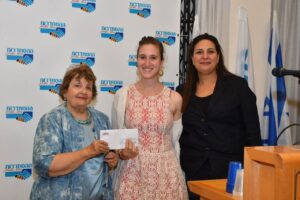 My research deals with nonlinear waveguide (NL-WG) which is a topic of research of great interest and importance. The high intensities in a strongly confined single-mode waveguide enables various nonlinear interactions at high efficiency such as self-phase modulation (SPM), cross-phase modulation (XPM) and wave-mixing. These effects can be exploited for several applications, such as pulse compression, demultiplexing high bit-rate pulses and more. Choosing the appropriate materials for the NL-WG should consider both light guiding properties such as low loss materials and high index contrast and nonlinear properties such as high nonlinearity and low two-photon-absorption (TPA) coefficient, resulting in a high figure of merit (FOM). The simple case of core nonlinearity was studied with different materials, for example crystalline and amorphous Silicon, Chalcogenide glasses and many more. However, fabrication of chalcogenide glass is complicated and the losses are very high, where in the silicon case the fabrication is well established but the high TPA value restricts the nonlinearity of the waveguides.
My research deals with nonlinear waveguide (NL-WG) which is a topic of research of great interest and importance. The high intensities in a strongly confined single-mode waveguide enables various nonlinear interactions at high efficiency such as self-phase modulation (SPM), cross-phase modulation (XPM) and wave-mixing. These effects can be exploited for several applications, such as pulse compression, demultiplexing high bit-rate pulses and more. Choosing the appropriate materials for the NL-WG should consider both light guiding properties such as low loss materials and high index contrast and nonlinear properties such as high nonlinearity and low two-photon-absorption (TPA) coefficient, resulting in a high figure of merit (FOM). The simple case of core nonlinearity was studied with different materials, for example crystalline and amorphous Silicon, Chalcogenide glasses and many more. However, fabrication of chalcogenide glass is complicated and the losses are very high, where in the silicon case the fabrication is well established but the high TPA value restricts the nonlinearity of the waveguides.
My research present a novel way of producing NL-WG. The waveguide’s core is a nanocomposite of a host PFCB polymer and homogeneously dispersed CdSe nanoparticles (NPs), the cladding is Cytop polymer chosen for its low losses around 1.55 mm and the low refractive index allowing strongly confined guided modes in the NL-WG. A homogenous dispersion of 1.3% volume concentration of CdSe in PFCB was demonstrated via in situ process and a full fabrication of NL WG was demonstrated.
I would like to thank you personally for your kind generosity! It is really warming to see your activities for promoting science among women!
Statement of Masua Sagiv
I am extremely pleased to express my deep appreciation and gratitude both for the honor and the award granted by the Scholarship’s donors. I am a Ph.D. candidate at the Zvi Meitar Center for Advanced Legal Studies in the Tel Aviv University Law Faculty. I also serve as a teaching assistant in feminism and the law, and regulation and legislation, at Tel Aviv University faculty of law. I am also part of the board of directors of the MEIDA center for contemporary religious groups in Israel in the Van Leer Jerusalem Institute.
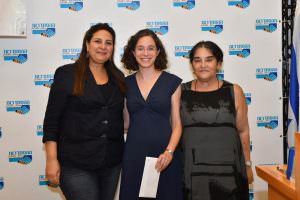 I earned my LL.B. (magna cum laude) in Law and Political Science in Bar-Ilan University (2009), and my LL.M. (with honors) in Columbia Law School (2011), where I also obtained the Parker School of Foreign and Comparative Law Certificate (2011). During my studies for the LL.M. degree I was a Harlan Fiske Stone Scholar, and Norman E. Alexander Fellow. I also received Bar Ilan’s Law Faculty’s Dean’s Scholarship for outstanding graduate students.
I earned my LL.B. (magna cum laude) in Law and Political Science in Bar-Ilan University (2009), and my LL.M. (with honors) in Columbia Law School (2011), where I also obtained the Parker School of Foreign and Comparative Law Certificate (2011). During my studies for the LL.M. degree I was a Harlan Fiske Stone Scholar, and Norman E. Alexander Fellow. I also received Bar Ilan’s Law Faculty’s Dean’s Scholarship for outstanding graduate students.
On a personal note, I am married, and the mother of three – Tamar, Matan and Eyal.
My dissertation explores and analyzes how Israeli religious feminists use the law in order to promote social change. The religious feminist struggle for social change is held against the backdrop of a philosophical and theological revolution taking place in the Jewish religious society in Israel. This revolution seeks to promote gender equality both in society and in the norms of Halacha (Jewish law). This revolution has a decisive effect on religious women, but also – due to the constitutional arrangements regarding religion and state in Israel – on secular women.
The research focuses on the religious feminist struggle, mapping and evaluating the various legal strategies that are used by the religious feminist movements in their struggle for social change. Through the examination of a number of case studies, such as marriage and divorce, religious professions, spiritual leadership, sexual assaults by spiritual leaders, and the Jewish life cycle, the dissertation illustrates the dilemmas and tensions standing at the heart of these movements’ social activity. Some of these dilemmas and tensions are characteristic to the activity of women’s and social organizations in general, and some are specific, and stem from the combination between feminism and the obligation to the values of the Jewish religion. The dissertation is aimed to the social movements, and focuses on a socio-legal examination of the struggle’s management.
Statement of Rawia Aburabia
Attorney Rawia Aburabia is a PhD candidate in the department of law at Hebrew University of Jerusalem. Ms. Aburabia is a fellow of “Human Rights under Pressure – Ethics, Law, and Politics” an international, interdisciplinary doctoral and post-doctoral study, research training group under the joint auspices of Freie Universität Berlin and The Hebrew University of Jerusalem. She is also a recipient of Ariane de Rothschild Women Doctoral Program. She holds bachelor’s degrees in law from Ono College and social work from Ben -Gurion University of the Negev, and an LL.M. from American University.
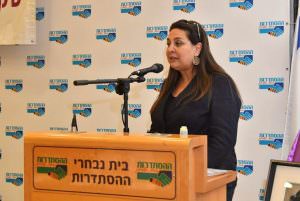 At 2009 she joined the Association for Civil Rights in Israel (ACRI), as a New Israel Fund Civil Liberties Fellow. Where she specialized in Human Rights violations of the Arab Bedouin minority, and litigated cases before the High Court of Justice.
At 2009 she joined the Association for Civil Rights in Israel (ACRI), as a New Israel Fund Civil Liberties Fellow. Where she specialized in Human Rights violations of the Arab Bedouin minority, and litigated cases before the High Court of Justice.
Attorney Rawia Aburabia has been at the forefront of several civil rights initiatives, many of which focused on Bedouin women’s rights. In addition, Ms. Aburabia is Israel’s premier expert on polygamy in Negev Bedouin society, having completed her master’s thesis, “Redefining Polygamy among the Palestinian Bedouins in Israel: Colonialism, Patriarchy and Resistance”. She is writing her PhD dissertation on the personal status laws of Palestinian Bedouin women from legal and political perspectives.
Research Description- Personal Status Laws of Palestinian Bedouin Women- Colonized by the Law
The current research deals with the colonial influences of the British Mandate on the personal status laws of Bedouin women in Israel. The intention of this research is to examine and analyze this policy of control, which operates through the preservation and administration of laws of personal status, especially such norms that maintain women as unequal to men. In its essence, this policy of control is also in line with colonial theory, that had long ago established the connection between control and the preservation of family law among indigenous societies. One of the main areas in which political control is exerted is the religious courts, and, in particular, the marriage and divorce laws that perpetuate patriarchal values and delineate the national boundaries of the Jewish-Palestinian collective in Israel. This delineation of boundaries has an adverse effect on the citizenship of women in general, and on Palestinian Bedouin women in particular. It is a reflection of the multiple levels of marginalization to which Bedouin women are subjected by virtue of being (1) women in a (2) patriarchal-tribal society as part of (3) an ethnic minority in a Jewish state. Family law as a political paradigm will be used as the main axis of this thesis, focusing on marriage and divorce laws of Bedouin women in the Shari’a court, in order to address the political and the patriarchal significance of the institutions of family and family law.
Statement of Maor Kalfon Hakhmigari
Dear NA’AMAT members,
My name is Maor Kalfon Hakhmigari, I’m a vocational psychologist.
First of all I would like to express my gratitude and utmost appreciation for the research grant I have received from NA’AMAT.
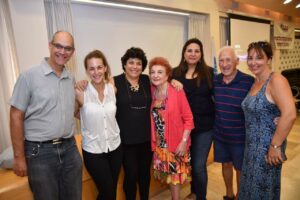 The work NA’AMAT is doing to advance the status of woman in Israel, as well as NA’AMAT’s investment in research in science and gender issues, is very important and meaningful.
The work NA’AMAT is doing to advance the status of woman in Israel, as well as NA’AMAT’s investment in research in science and gender issues, is very important and meaningful.
On behalf of the recipients I would like to convey to the donors in NA’AMAT USA and NA’AMAT Canada our appreciation. Your grant helps each of us to fulfill our professional goals. I hope that our research will contribute to gender equality and help to create a more egalitarian society.
I’m an expert in personal vocational counseling. I assist people to choose the right career path for them regarding their personal needs, characters, life story, talents, and tendencies. Career decision making is significant and very important in human development and well being. I meet many young people, particularly young women who are required to combine work and family roles. The requirement to successfully meet these two positions is complex. Personally, I experience this work -family conflict in my daily life. During my internship I gave birth to my first child, and currently I combine roles as a mother, a wife, a psychologist and a PhD student.
I study at Bar-Ilan University at the Department of Psychology, under the direction of Prof. Shmuel Shulman. My research: ‘Balancing career and family among young adults: The role of intergenerational transmission and partners support’, deals with the requirement to balance work and family while considering parents influence and romantic partner support.
Many studies highlight the significant role of parents in shaping the perception of their children’s career (Kalil et al., 2005). Alongside career, many of the employed are required to deal with the combination of work and family roles at the same time (McNall, Nicklin, & Masuda, 2010). Parents may also have a significant role in the ability of their children to balance work and family. The way parents manage their multiple roles in the work and family domains, can serve as a model for their children, which may be transmitted in intergenerational process, or through a process of learning and imitation. However, as far as we know, intergenerational transmission of work- family balance has not been studied much in the past (Polk, 2015), and in this study we seek to test the continuity and change of intergenerational transmission processes regarding work-family balance. In addition to the parental models that the individual came with from his parents’ house, romantic partners may also influence this balance. The partner may serve as a source of support in achieving the goals of the individual (Fitzsimons &Finkel, 2010), and may affect the way the individual will balance work and family roles (Domene et al., 2012). In the present study, therefore, we also seek to examine how the quality of the relations between the partners, and in particular, how the level of support and willingness to sacrifice from the partner, relates to the way the individual balance between work and family. In addition, we will examine the relations between work-family balance and life satisfaction and personal development. The current study is conducted on a sample of Israelis emerging adults who participated in a longitudinal study. Four assessments were conducted in the past, and the current study will include also data from the 5th assessment conducted to address the study questions. The study is based on analyzing semi-structured in-depth interviews that were transferred in the past and in the present, and on personal questionnaires fulfilled by the participants and their partners.
I hope my research will make a contribution both on the theoretical and practical level, once again thank you for your donation.
Best regards,
Maor
